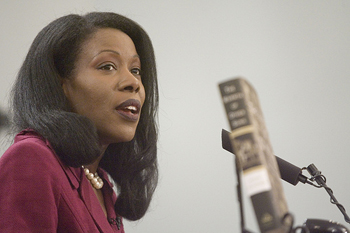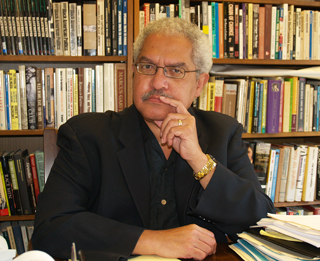488 Years Later:
Resources for Black History Month
For Sunday January 26, 2014
Lectionary Readings (Revised Common Lectionary, Year A)
Isaiah 9:1–4
Psalm 27:1, 4–9
1 Corinthians 1:10–18
Matthew 4:12–23
On Monday January 20 Americans will observe Martin Luther King, Jr. Day. Ronald Reagan signed the holiday into law in 1983. Beginning in 1986, the third Monday in January has been a federal holiday to honor the birthday of the great pastor, Nobel Peace Prize winner, and civil rights leader.
Close upon its heels, February is Black History Month.
The first African slaves were brought to what's now the United States by Spanish explorers in 1526, to a settlement in present-day South Carolina that lasted only three months, and then again in 1565 to another settlement that founded Saint Augustine, Florida.
 |
Isabel Wilkerson, Pulitzer Prize winner. |
Thanks to a letter from the Jamestown colonist John Rolfe, we also know about the first blacks in British North America. In a letter of January 1620 to Sir Edwin Sandys, the treasurer of the Virginia Company back in London, Rolfe describes how in late August of 1619, a pirate ship named the White Lion landed about thirty miles from Jamestown. He writes that the "Comandor" of the ship, Captain Jope, "brought not any thing but 20. and odd Negroes, which the Governor and Cape Marchant bought for victualls (whereof he was in greate need as he pretended) at the best and easyest rates they could."
Four days later, another pirate ship called the Treasurer arrived with more Africans. These blacks ended up in America after being bought by Portuguese slave traders in Angola, then stolen by pirates off the coast of Mexico, which pirates later landed near Jamestown.
That makes for nearly 500 years of black history in America. The US census of 1860 identified four million slaves in America.
It's taken a long time, but we've come a long way. And we still have a long way to go. I'm grateful for MLK Day and Black History Month as opportunities to reflect on our country's past, present, and future as it pertains to America's 40 million black citizens.
A few years ago I observed Black History Month by reading some primary materials on the subject. Of the many good options, I chose three slave narratives: Narrative of the Life of Frederick Douglass (1845), the Narrative of Sojourner Truth (1850), and Incidents in the Life of a Slave Girl (1861) by Harriet Jacobs.
To help you honor Black History Month, and to kick start your own thinking, here are some books, films, and poetry reviewed at JwJ. Click on the links for full reviews. ---dan
Books
- Michelle Alexander, The New Jim Crow; Mass Incarceration in the Age of Colorblindness (2010).
- James Allen, Hilton Als, Congressman John Lewis, and Leon F. Litwack, Without Sanctuary; Lynching Photography in America (2000).
- Harry Belafonte, with Michael Shnayerson, Harry Belafonte: My Song (2011).
 |
Manning Marable, Pulitzer Prize winner. |
- Lerone Bennett, Before the Mayflower; A History of Black America (1962).
- Bertice Berry, The Ties That Bind; A Memoir of Race, Memory, and Redemption (2009).
- Devon W. Carbado and Donald Weise, editors, The Long Walk to Freedom; Runaway Slave Narratives (2012).
- Philip Dray, At the Hands of Persons Unknown; The Lynching of Black America (2002).
- Drew Gilpin Faust, This Republic of Suffering; Death and the American Civil War (2008).
- Adam Hochschild, Bury the Chains; Prophets and Rebels in the Fight to Free an Empire's Slaves (2005); and King Leopold's Ghost: A Story of Greed, Terror, and Heroism in Colonial Africa (1999).
- Gwen Ifill, The Breakthrough; Politics and Race in the Age of Obama (2009).
- Beverly Lowry, Harriet Tubman, A Biography (2007).
- Manning Marable, Malcolm X; A Life of Reinvention (2011).
- Mark Noll, The Civil War as a Theological Crisis (2006).
- David S. Reynolds, Mightier Than the Sword; "Uncle Tom's Cabin" and the Battle for America (2011).
- Eugene Robinson, Disintegration: The Splintering of Black America (2010).
- Charles Henry Rowell, editor, Angles of Ascent; A Norton Anthology of Contemporary African American Poetry (2013).
- David Shipler, A Country of Strangers: Blacks and Whites in America (1997).
- Jeanne Theoharis, The Rebellious Life of Mrs. Rosa Parks (2013).
- Isabel Wilkerson, The Warmth of Other Suns (2010).
Movies
-
12 Years a Slave (2013). Pulitzer Prize winner Eugene Robinson.
Pulitzer Prize winner Eugene Robinson. - 20 Feet From Stardom (2013).
- 42 (2012).
- Django Unchained (2012).
- Do the Right Thing (1989).
- Eyes on the Prize (1987, 1990), a 14-hour (7 DVDs) PBS documentary on the American Civil Rights Movement.
- Fruitvale Station (2013).
- Lee Daniels' The Butler (2013).
- Lincoln (2012).
- Precious (2009).
- Ray (2004).
- Red Tails (2012).
- Shawshank Redemption (1994).
- Standing in the Shadows of Motown (2002).
- The Help (2011).
- Tupac: Resurrection (2003).
- Unchained Memories; Readings from the Slave Narratives (2003).
Poetry
Image credits: (1) Flickr.com; (2) Wikipedia.org; and (4) The National Democratic Institute.





